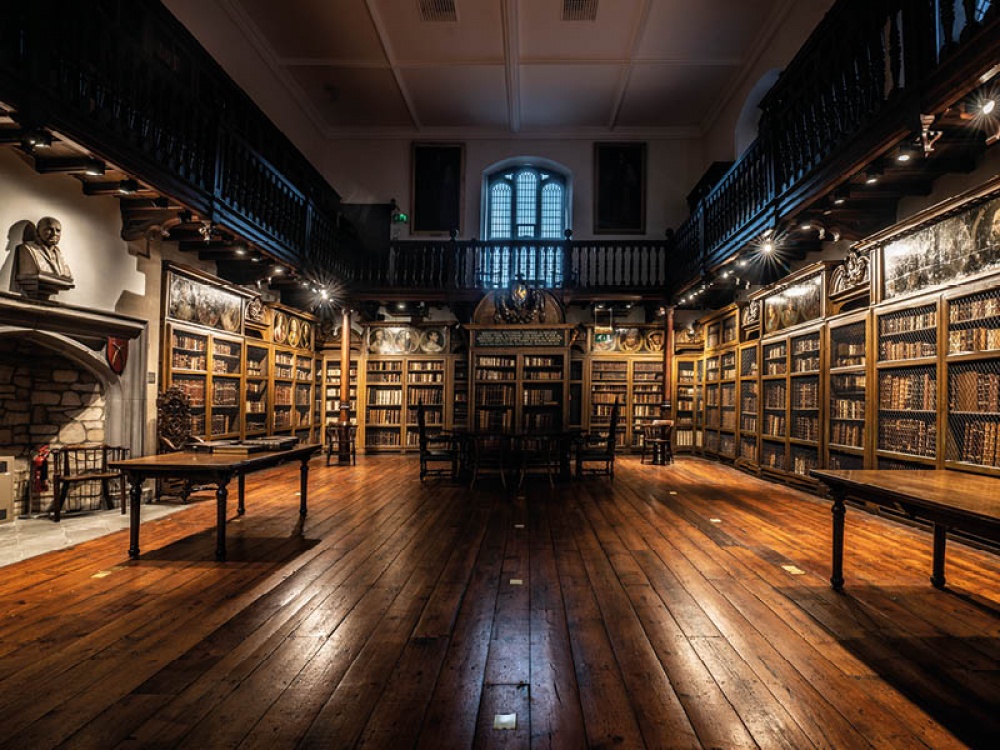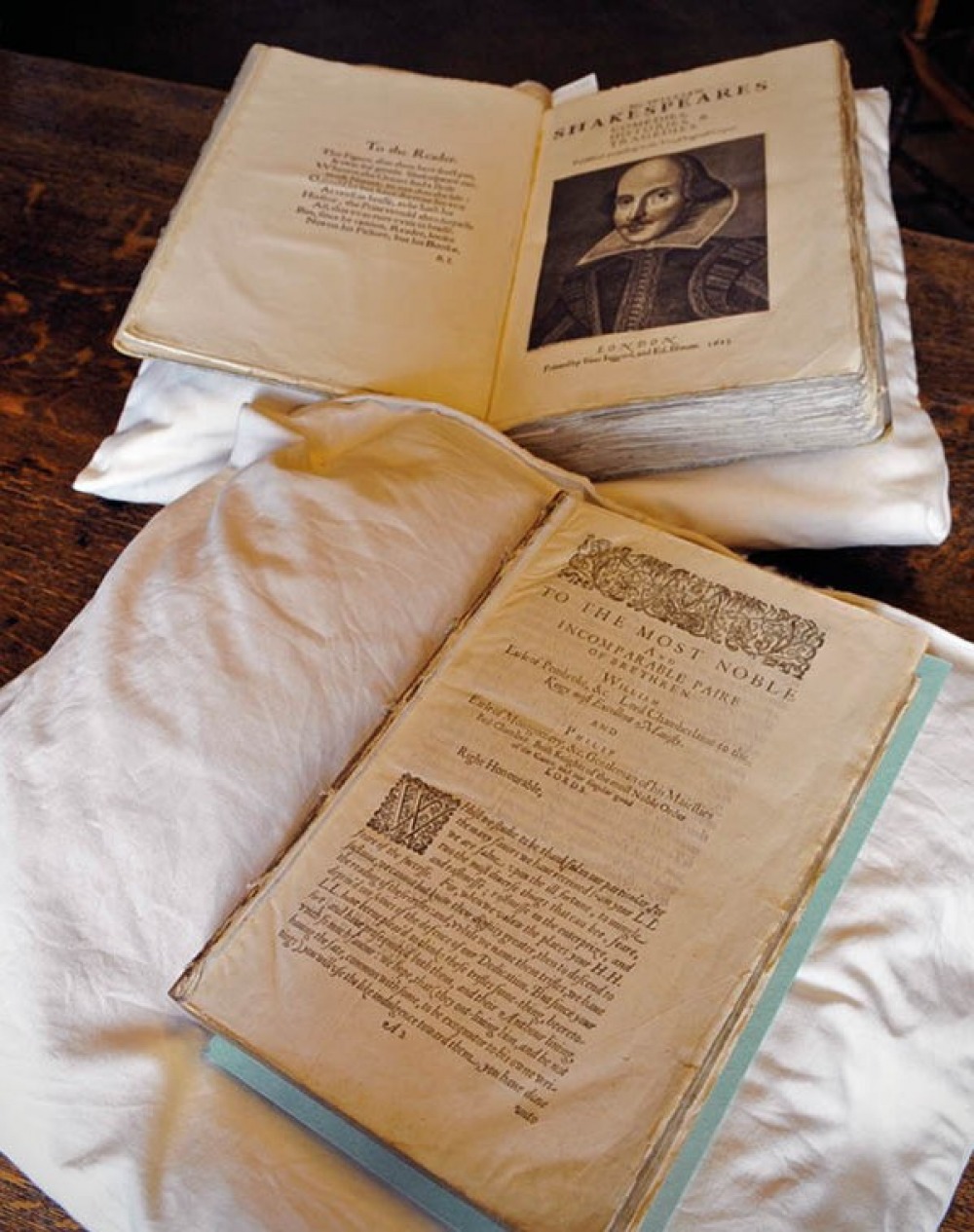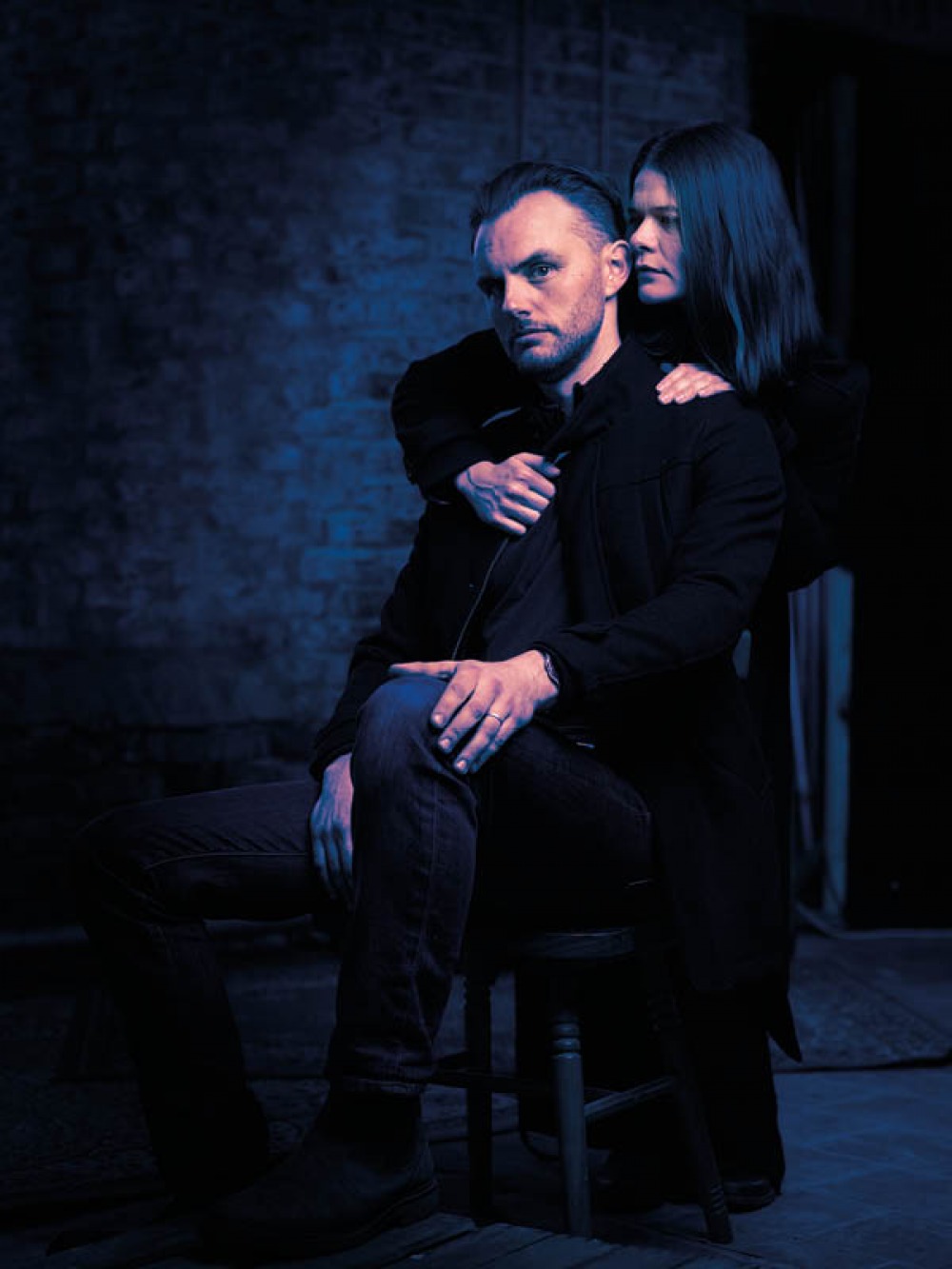Durham's Shakespeare Festival Celebrates the 400th Anniversary of the Complete Works

To celebrate the 400th anniversary of the publication of the complete works of Shakespeare, Elysium Theatre Company have created Durham's own Shakespeare Festival
Mr. William Shakespeare’s Comedies, Histories, & Tragedies was published in November 1623, but these days it’s better known as the First Folio, because it was followed by three more folio editions in the 17th century. ‘In those days, books were expensive to produce because so much had to be done by hand, unlike today when we can type the words and print them off in a matter of minutes,’ says Dr Danielle Westerhof, rare books curator at Durham University. ‘A folio book was particularly costly because it used a lot of paper: pages were printed on large sheets of paper and then folded to create little booklets that were then bound together. If a text was printed in folio, it meant that paper sheets were only folded once, creating booklets of four pages. This format was usually reserved for serious subjects and not something as flippant as drama, so the First Folio was quite remarkable when it was first published: it was the first large format book that contained only plays.’
‘The First Folio has been held in the same location
for the longest period out of all surviving copies’

Of the 750 copies Durham University staff believe were printed at the time, they know of 235 still in existence in the world, with 82 held by the Folger Shakespeare Library in Washington DC. ‘Each of these copies has a unique history, although very few as dramatic as Durham’s First Folio,’ Danielle reveals. ‘Having been in the same location for most of its existence, one day in December 1998 it was stolen with six other books from a display in Cosin’s Library. Ten years later, a damaged First Folio allegedly found in Cuba was handed in at the Folger Shakespeare Library in Washington DC for assessment. Although other First Folios are occasionally still being discovered in old libraries, experts at the Folger soon realised that something was not quite right about the story they were presented with,’ she continues. ‘After extensive bibliographic detective work, they realised that the book was in fact Durham’s copy of the First Folio and in 2010, after a court trial reached the same conclusion, the Folio was formally returned to us.
Since that time, use has been infrequent because it is considered too fragile for academic teaching and research. After a short initial exhibition celebrating its return in 2010, it has only been brought out for inspection by University Library staff.’
The First Folio has been held in the same location for the longest period out of all surviving copies. ‘Moreover, there are not many other copies of the First Folio that can be associated with a single owner – most Folios have passed through multiple hands,’ says Danielle. ‘The Durham First Folio was acquired by John Cosin, future Bishop of Durham, probably before 1632 (which was the year the Second Folio was published). In 1669, Cosin added his copy of the First Folio to the public library he built on Palace Green. We know this because it is mentioned in a library catalogue written at the time.’
‘We have had many opportunities over the past year to discuss the significance of this book’s longstanding presence in Durham with academics, students, and the local community,’ says Cosin’s Library book conservator Lauren Moon-Schott. ‘What has become clear in these conversations is that this Folio in particular is more than a book to the community. It is a communal source of pride and serves as a local connection to national heritage. Even the story of the theft, which disrupts the book’s historic presence in the city, in many ways helped to solidify the feeling of community ownership over it when it was finally recovered.’
This year marks the 400th anniversary of its publication, so celebrations are in order and the university are using this opportunity to reflect on what makes the Durham First Folio unique, and how best to conserve it in a way that recognises its significance as a cultural artefact while also taking into account its more recent history. ‘Our aim is to make it possible to use the Folio in teaching, research and display again,’ says Danielle.
‘A programme of further research and consultation with conservation experts is now underway and from June, readers can follow updates on our progress online.’
Celebrating the anniversary of the publication of a book isn’t something the university do regularly, but Shakespeare is a cultural icon. ‘The English language is littered with phrases coined by Shakespeare in his plays and most young people will study his drama and poetry,’ adds Danielle. ‘The First Folio ensured that his plays were preserved for future generations. Eighteen of the 36 plays had not been published before, so without the First Folio we would not have Macbeth or The Tempest. Moreover, as a cultural artefact, the Folio has become a close link to Shakespeare himself, even though he had been dead seven years when it was published. The words on the page and the physicality of the book itself give us the sense that we are in Shakespeare’s presence.’
Jake Murray, artistic director and co-founder of award-winning Elysium Theatre Company, is celebrating his 30th year as a director. He moved to Durham in 2016 after meeting his wife and they were the first people in history to get married in Durham Castle (but that’s a story for another time). In 2017 he founded Elysium with friend and actor Danny Soloman, and while they started with low budget productions, they now tour 15 to 20 venues all across the North East (Alnwick, Hexham, Berwick, Washington, Durham, Bishop Auckland and Barnard Castle). ‘We’ve had incredible support from the theatre scene up here,’ Jake says.
‘The English language is littered with phrases coined by Shakespeare in his plays and most young people will study his drama and poetry’


Prior to his Elysium days, Jake directed a production of Romeo and Juliet at The Royal Exchange in Manchester – the only professional Shakespeare production he’s directed, which starred a young Andrew Garfield and Gugu Mbatha-Raw. Having always been a Shakespeare fan, when he first moved to Durham he walked to Palace Green, where the cathedral and castle are, and thought it would be the perfect place to hold a Shakespeare festival. ‘Nothing came of that for years because I didn’t have the resources,’ he says. ‘But last year, when we were rehearsing A Doll’s House, I had lunch with Stephen Cronin [Durham Fringe Festival’s director]. He’d been put in touch with me by Dr Nicola Candlish at Durham University, he wanted to ask me how he could raise the visibility of [Durham Fringe]. I said “what you need is a very high profile production, like a Shakespeare”, and he replied “would you like to direct it?”. I was exhausted from rehearsals at the time so laughed it off, but a little while later the university approached me about this 400th anniversary. That’s when it all came together, giving birth to the Shakespeare Festival, which is in partnership with the university and Durham Fringe Festival. Everything’s really coming together and that idea I had all those years ago is now really happening, which feels fantastic.’

‘We’re performing from the original texts so you’ll get the full glory of the language and the action and you can see it in all sorts of different places’
For the Durham Shakespeare Festival this July, Elysium Theatre Company are performing two of Shakespeare’s most famous and popular plays, Macbeth and A Midsummer Night’s Dream. ‘I’ve wanted to do Macbeth for years,’ Jake says. ‘The way it works with my company is that we have our core actors and they perform in all our plays. This ensemble of actors has grown with us. Danny [Soloman], has been in seven or eight out of our 10 shows, and has played everything from a Northern Irishman to a New Yorker, and it seemed like a really natural progression to do Macbeth with him because he’s a fantastic actor. Hannah [Ellis Ryan] has worked with him as either his wife or his sister so these are two actors who I really trust, and they trust each other, so it felt absolutely right. It’s also a really popular Shakespeare. It’s thrilling and exciting, dynamic and frightening. It’s all the things I love: a bit of supernatural and horror too.
‘A Midsummer Night’s Dream is one of my favourites, but this is being directed by Dan Bradford, who is our first guest director, and I gave him complete freedom to choose the comedy that he wanted. This is the one he chose. Both are full of the supernatural: the witches and ghosts in Macbeth and the fairies and magic in A Midsummer Night’s Dream. We felt we needed these popular shows to launch the festival. Thirteen actors will be performing in both shows and we’re performing from the original texts so you’ll get the full glory of the language and the action and you can see it in all sorts of different places. Ushaw House has its wonderful Victorian lecture theatre, The Assembly Rooms is a beautiful old theatre in the centre of the city and Palace Green will have all the spectacle of the open-air and its historic surroundings. We hope that if it really works we can take these shows all around the county.’
Read More: The Most Popular Musicals Coming to the North East and Yorkshire
Jake wants the festival to be accessible right across the county so Elysium are also running an ambitious engagement programme reaching out to all the schools in County Durham, from Bishop Auckland and Barnard Castle to Peterlee and Crook. ‘We’re offering workshops, encouraging schools to come to the shows, and we’re also running online events where we’ll be interviewing famous actors about their experiences, and scholars about the First Folio. We’re already casting and at least three of our actors are from here (Crook, Consett and Bishop Auckland). We really want this to be not just for Durham but the whole of the North East. This is about taking pride in what we have here and celebrating it. A lot of the actors from the North East who are working with us say they never get the chance to perform Shakespeare so there’s a lot of excitement. We really hope that the Shakespeare Festival will take place every year.
‘There’s a real hunger to watch Shakespeare. Whenever we’ve told people we’re doing a Shakespeare Festival, everyone gets excited. He’s still got that magic of recognition. People know that if they’re going to see Shakespeare they’re going to have a wonderful evening. I think there’s also a feeling of national pride in Shakespeare and that’s really important, but for me they’re just fantastic plays. They’re still relevant. Macbeth is still so modern in its politics and psychology, for example. The play just doesn’t date. We’re bound to learn a lot from this for, hopefully, future Shakespeare festivals.’







